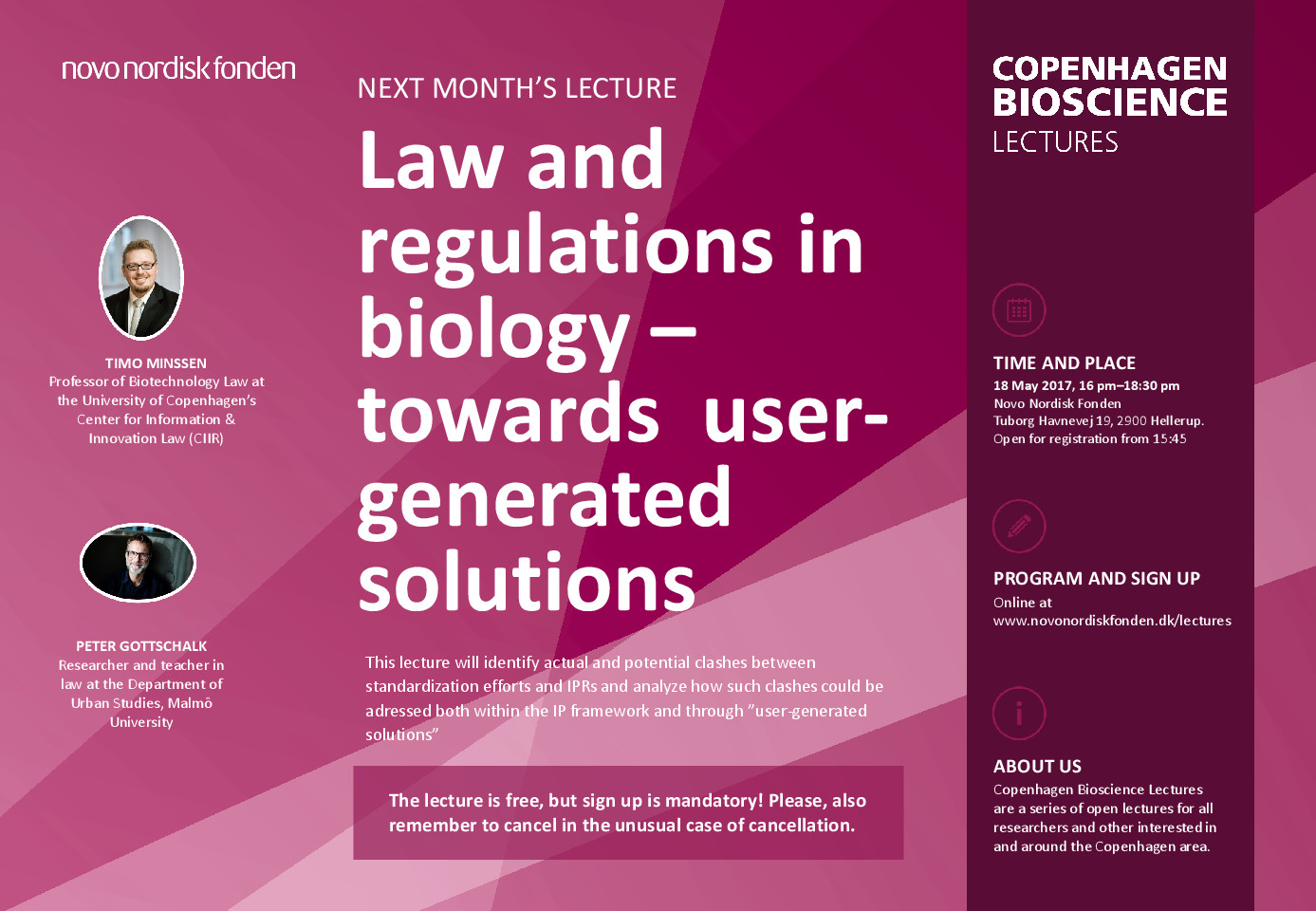Universitetsavisen
Nørregade 10
1165 København K
Tlf: 21 17 95 65 (man-fre kl. 9-15)
E-mail: uni-avis@adm.ku.dk
Foredrag
Foredrag — Join us for the Copenhagen Bioscience Lecture on 18 May 2017 that will give you an insight law and regulation issues in biology.
Date & Time:
Place:
Novo Nordisk Fonden
19 Tuborg Havnevej
2900 Hellerup
Denmark
Hosted by:
Novo Nordisk Fonden
Cost:
Free
CONCEPT
The Copenhagen Bioscience Lectures are a series of open lectures for all researchers and other interested in and around the Copenhagen area. Every 4 weeks, on a Thursday evening, you are invited for lectures on themes with a general interest for the Novo Nordisk Foundation Research Centers and bioscience researchers in general. Often there will be a cross-disciplinary focus. The lecture on 18 May 2017 will give you an insight law and regulation issues in biology.
PROGRAMME
15:45 Welcome and registration (coffee/tea, water available)
16:00 Talk by Timo Minsson on ‘Openness, Standardization & Intellectual Property Rights in Synthetic Biology – Towards innovative user-generated solutions’
16:45 Talk by Peter Gottschalk on ‘Access to genetic resources for research purposes’
17:30 Networking with a drink and a snack
18:30 Thank you for a splendid end of day!
REGISTRATION
Registration is completely free of charge, but mandatory.
ABSTRACTS
This lecture discusses the complex interface between standardization, IPRs and open innovation in Synthetic Biology and Systems Biology (jointly referred to as SB). This encompasses the consideration of pressing questions of innovation policy, such as whether the technological plurality of SB is compatible with the existing legislation, policies, institutional and governance frameworks for standardization and IPRs. In particular, this lecture will identify actual and potential clashes between standardization efforts and IPRs and analyze how such clashes could be adressed both within the IP framework and through ”user-generated solutions”.
Access to genetic resources is linked to how states exercise sovereign rights over their resources. In the Nagoya Protocol negotiations, access was a main negotiation issue and concerns were raised that more stringent access rules could stifle research. In addition to general access provisions, Article 8 of the Protocol regulates so called ‘Special Considerations’, including non-commercial research. In the EU, a Regulation on implementation of the Nagoya Protocol governs the access issue through a ‘due diligence’ concept. This lecture describes the issue of access to genetic resources for research purposes and discusses how access is governed in the Nagoya Protocol as well as in the EU Regulation on implementation.
BIOs
Timo Minssen is Professor of Biotechnology Law at the University of Copenhagen’s Center for Information & Innovation Law (CIIR). Heading CIIR’s Biotech & Pharma Research Group, he leads 4 major interdisciplinary research projects concerning biobanks, synthetic biology, systems biology, precision medicine, and large research infrastructures. He is also scientific advisory board member of the Copenhagen Centre for Regulatory Sciences (CORS) and steering committee member of the Danish Association for the Protection of Industrial Property. Professor Minssen holds a German law degree, as well as biotech & IP -related LL.M and LL.D. degrees from Lund & Uppsala University (Sweden). He has also been Visiting Research Fellow at the Universities of Cambridge & Oxford (UK), Harvard Law School, the Chicago-Kent College of Law (US), as well as at the Max Planck Institute for Innovation & Competition (Germany). Moreover, he was trained in the German Court system and at the European Patent Office.
Peter Gottschalk, L.L.M. Lund University Faculty of Law 1995, is a researcher and teacher in law at the Department of Urban Studies, Malmö University. His current research focuses on the Nagoya Protocol on Access to Genetic Resources and the Fair and Equitable Sharing of Benefits Arising from their Utilization. Gottschalk has been a teacher and researcher in international law at the Faculty of law, Lund University. Gottschalk has also practiced business law, specializing in intellectual property law, and served as law clerk at the District Court of Malmö and at the Scania and Blekinge Courts of Appeal.
FAQs
I would like to know about upcoming Copenhagen Bioscience Lectures – where can I find information?
You are very welcome to join the ‘Novo Nordisk Foundation Research Centers’ Linkedin group. There you will find information about upcoming lectures, and much more. Also, you may want to sign up for the weekly announcement with events and deadlines, sent out by the group manager.
What are my transport/parking options getting to the event?
We organise transport from and to Panum and DTU building 220. You can read more and register for this in the registration form.
You can park for free in front or at the side of Tuborg Havnevej 19. If that is full, there is 3 hours free parking in the parking to the Waterfront shopping mall at the end of the road.
Public transport by train to Hellerup station, and/or bus (1A, 21, 166), nearest by bus stop is Tuborg Boulevard.
Where can I contact the organizer with any questions?
Contact Sophie Labrosse at sfeb@novo.dk
How do I cancel my participation?
Please help us respecting our speakers, as well keeping track of the numbers and optimize lecture and catering to the audience by cancelling as soon as you know that you exceptionally will not be able to make it. You can either cancel through Eventbrite or send an email to Sophie Labrosse (sfeb@novo.dk).
Can I update my registration information?
Yes, just log in to Eventbrite. Please use this option also in the unlikely event that you need to cancel your registration.
Do I have to bring my printed ticket to the event?
No, you do not have to bring your ticket, but registration is mandatory for participation.
